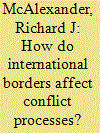| Srl | Item |
| 1 |
ID:
171809


|
|
|
|
|
| Summary/Abstract |
In this article, I examine the relationship between migration and terrorism in Western European countries from 1980 to 2004. I find that an increase in migration is positively related to an increase in terrorism, but only right-wing terrorism. Immigration has no effect on left-wing terrorism or other non-right-wing terrorism. I also examine the effect of incoming refugees on terrorism and find similar results. I argue that these population flows increase terrorism in part because they aggravate the grievances of those on the radical right. To provide empirical support for this mechanism, I conduct a subnational analysis of right-wing terrorism in Germany. For German states, the percentage of foreign-born immigrants is a bigger predictor of anti-immigrant violence than economic variables such as employment or trade levels. The flow of immigrants from outside of Europe is also positively related with right-wing terror, while no relationship exists for intra-European migration. This analysis serves to qualify the study of terrorism as a strategic choice by showing that increased antipathy toward an out-group, rather than a changing strategic environment, explains variation in levels of terrorism, at least among liberal democracies.
|
|
|
|
|
|
|
|
|
|
|
|
|
|
|
|
| 2 |
ID:
192876


|
|
|
|
|
| Summary/Abstract |
Rebels can comply with international law during a conflict by not violating international borders, yet strategic goals may incentivize rebels to violate these borders. When do international borders affect the spatial and temporal distribution of rebel activity in a conflict setting? I theorize rebels have an incentive to refrain from violating borders when doing so will reduce their international legitimacy. When international legitimacy is a less important goal, rebels will be more likely to violate borders. I test this claim in the context of the 1948 War in Mandate Palestine by exploiting a quasi-natural experiment in how the 1947 UN partition line was drawn. Using an original dataset on over 1,000 Palestinian villages from British colonial documents and an atlas of aerial photographs of Palestine, I use a geographic regression discontinuity design to see how the UN partition line affected the location and timing of depopulated villages during the war. The results show that villages in areas that the UN assigned to the future Israeli state as part of the 1947 partition plan were more likely to be conquered before Israel received recognition. These findings have important implications for understanding where and when rebels target areas and shed new light on important dynamics of the 1948 War in Palestine.
|
|
|
|
|
|
|
|
|
|
|
|
|
|
|
|